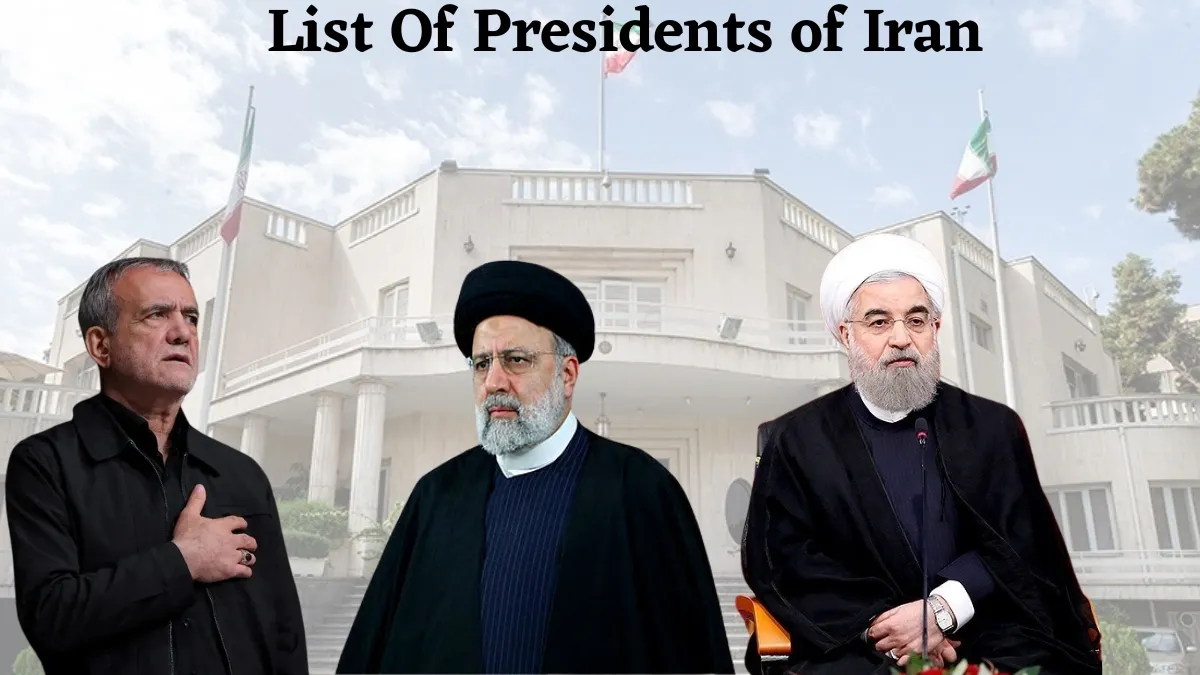The President of Iran is the highest popularly elected official in the country, functioning as the head of government (while the supreme leader is the highest authority). Since the 1979 Islamic Revolution, Iran has seen a range of presidents, each reflecting shifts in political ideologies, domestic priorities, and international relations. After the prime minister post was eliminated in 1989, the President of Iran became responsible for overseeing the governance of Iran.
What is the role of the President of Iran?
While Iran’s Supreme Leader holds the ultimate power, the president also leads the executive branch, oversees economic policies, manages foreign relations and implements national legislation. For day-to-day governance of Iran, the president is the only one responsible and plays a very important role in shaping the country’s domestic and international image.
List Of Presidents of Iran
Presidents of Iran from 1980 to 2025 | |||
|---|---|---|---|
| No. | Name | Term of Office | Political Orientation |
| 1 | Abolhassan Banisadr | 1980–1981 | Independent (later exiled) |
| 2 | Mohammad-Ali Rajai | Aug 1981 – Aug 1981 | Islamic Republican Party |
| 3 | Ali Khamenei | 1981–1989 | Islamic Republican Party |
| 4 | Akbar Hashemi Rafsanjani | 1989–1997 | Independent (Pragmatic Conservative) |
| 5 | Mohammad Khatami | 1997–2005 | Reformist (Association of Combatant Clerics) |
| 6 | Mahmoud Ahmadinejad | 2005–2013 | Principlist (Abadgaran) |
| 7 | Hassan Rouhani | 2013–2021 | Moderate (Executives of Construction Party) |
| 8 | Ebrahim Raisi | 2021–2024 (Died in office) | Principlist (Conservative) |
| 9 | Mohammad Mokhber (Acting) | May 2024 – June 2025 | Conservative |
| 10 | Masoud Pezeshkian | June 2024 – Present | Reformist |
A brief overview of the Presidents of Iran from 1980 to 2025
1. Abolhassan Banisadr: He was the first president of the Islamic Republic. He was a secularist who clashed with clerics and also opposed the hostage crisis policy, and was impeached after losing support from his party.
2. Mohammad-Ali Rajai: After the impeachment of Abolhassan Banisadr, Mohammad-Ali Rajai took a position as the new President of Iran. Less than one month after serving as the president of Iran, he was killed in a suitcase bomb attack.
3. Ali Khamenei: He serves as the president of Iran after Mohammad-Ali Rajai. Ali Khamenei played a very important role in the Iran-Iraq War and also strengthened the Islamic Revolutionary Guard Corps (IRGC). In 1989, he was elected as Supreme Leader, and during his presidency, clerical rule and security forces were aligned softly.
4. Akbar Hashemi Rafsanjani: He was the first president in Iran after the elimination of the prime minister role in Iran. He was more focused on reconstruction, privatisation, and moderate liberalisation.
5. Mohammad Khatami: He was the reformist cleric who encouraged civil liberties and was more dedicated towards an open society. He also coined the term “Dialogue Among Civilisation” and ties with the West.
6. Mahmoud Ahmadinejad: He helped the Iran to start the the Iran’s nuclear programme and make expansion of the Islamic Revolutionary Guard Corps (IRGC)
7. Hassan Rouhani: He was the moderate leader of Iran, and in 2015 he lead nuclear deal in Joint Comprehensive Plan of Action (JCPOA) with the US, but in 2018, US withdrew from the JCPOA.
8. Ebrahim Raisi: He was involved in religiously conservative politics and has good connections in the judiciary and religious elite. In 2024, during his presidential tenure, he died in a helicopter crash during his official duties.
9. Mohammad Mokhber (Acting): After the death of Ebrahim Raisi, the president's seat was vacant due to the sudden death of Ebrahim Raisi. Mohammad Mokhber became the acting President of Iran till a new president is elected. Before being appointed as President of Iran, he was the vice president who took charge of the President of Iran for about 50 days.
10. Masoud Pezeshkian: He is the current President of Iran, who has taken over after the death of Ebrahim Raisi in June 2024. He promised to renew Iran’s nuclear program and make domestic moderation. His victory makes the hopes of Iran for not having uncertain changes and promises to make it a peaceful country.
